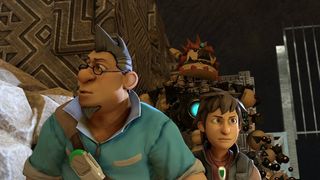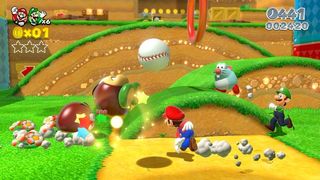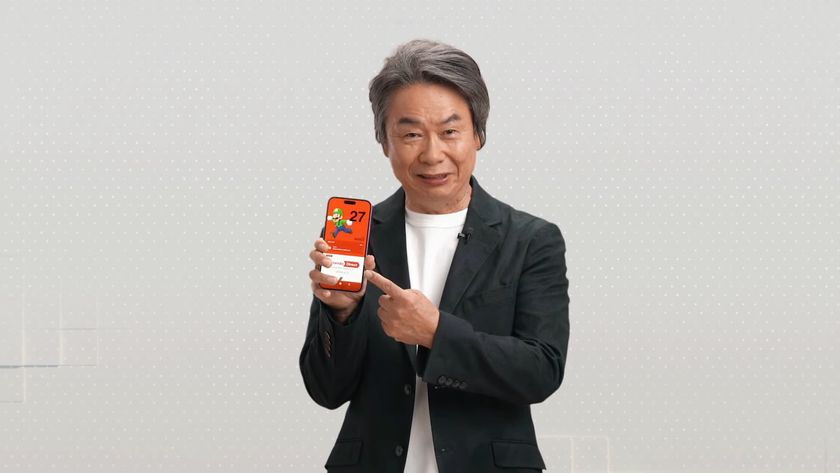Mario games don't give a damn about story (and that's wonderful)
Pardon me while I get a little judgy. You may remember from a few weeks ago when I wrote about asking Mario creator Shigeru Miyamoto about remakes. It started a conversation, and I was happy. Others in attendance asked significantly worse questions. One in particular involved how the developers handle writing for Mario characters, namely Princess Peach. Even before the devs answered, I rolled my eyes at this guy wasting his sole query on something so obvious. Mario doesn’t bother with plot, and his games are stronger for it.

Miyamoto’s response to that fruitless, questionable question was what you’d have predicted after playing any number of Mario games: the story and characterization are meant to be expressed through gameplay. They don’t give a shit about Mario’s “agency” or “ludonarrative dissonance” and neither do I. You know the differences in the personalities of the playable characters based on how they run and jump. Mario games only need the flimsiest of excuses to send players into the many stages in front of them. Anything more gets in the way of the intentionally straightforward design of Mario games.
Super Mario 3D World begins with a wordless and brief cinematic showing Bowser kidnapping seven magical Sprixies. Mario and his pals chase after Bowser--then BOOM, you’re in World 1, jumping on Goombas. Each Sprixie you free has about 20 seconds of celebratory animation; when you battle Bowser for the final time you get another light cinematic; and then, finally, you get the credits. The end.

As video game storytelling matures and expands, Mario’s dearth of narrative might seem backwards and wrong. But as much as I welcome games advancing their writing, releases like 3D World prove that AAA games can totally ignore the typical action-film plotting that most titles resort to--if the gameplay is good enough. 3D World doesn’t need a cutscene where Mario and Peach discuss their plans to avenge Bowser’s destruction of the Mushroom Kingdom, and Luigi need not confide in Toad about his crushing self-doubt. You learn all you need to know about the cast from a simple “Woo-hoo!”
Compare that to a more contemporary platformer like Knack. It starts with a simple set-up-- humanity needs a robot that can stop a monster invasion--but soon enough it gets needlessly complicated. You’re introduced to Knack’s cheesey personality, see some secretly evil character slowly plan his betrayal, and watch a scientist pine for his late wife. These types of easy, predictable story elements don’t make the game play any better, nor does the writing aspire for anything above the most rote children’s film.

Instead of learning from past Mario games or other contemporaries like Super Meat Boy and Rayman Legends, Knack spent time and money creating lengthy cutscenes to tell a thoroughly perfunctory story, when its gameplay fundamentals could've used some extra effort instead. 3D World is satisfied with being the best game it can be, instead of preoccupying itself with telling the equivalent of a direct-to-DVD Disney movie.
Of course, I don’t need to pick on Knack to make this point, because Mario himself was held back by an overemphasis on the brain-dead-zombie-urgh plotting. Both Super Mario Galaxy games told their stories through level progression and boss battles, but before that, Super Mario Sunshine went the opposite direction. Sunshine had continued the series' quality gameplay, but there were way too many lengthy cutscenes to tell a story of false imprisonments, island natives’ distrust, and the mystery of Bowser Jr.’s mother. Just watch this Mecha Bowser battle to see how on-screen dialogue only gets in the way of a truly fun section.
Sign up to the 12DOVE Newsletter
Weekly digests, tales from the communities you love, and more

Though Sunshine went on to be one of the best-selling GameCube games, the developers noted how the talkative cutscenes pushed players away from Mario’s better attributes. The franchise went back to its roots from then on, valuing gameplay above all else, which continues to serve the series well in Super Mario 3D World. It can all be traced back Mario’s earliest hit: the original Donkey Kong arcade game.
Mario’s debut game had the thinnest of three-act structures: ape grabs girl, man battles ape, man saves girl. Here we are 32 years later, and Mario is still following that same basic template. Some may call that overused or childish--but if the games can stay as fun as 3D World, that’s all the plot needs for the next 32 years.
Henry Gilbert is a former 12DOVE Editor, having spent seven years at the site helping to navigate our readers through the PS3 and Xbox 360 generation. Henry is now following another passion of his besides video games, working as the producer and podcast cohost of the popular Talking Simpsons and What a Cartoon podcasts.











